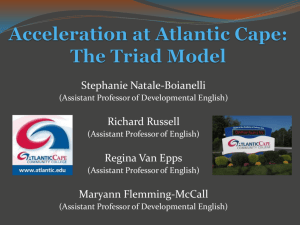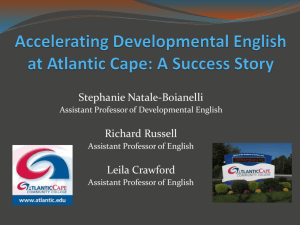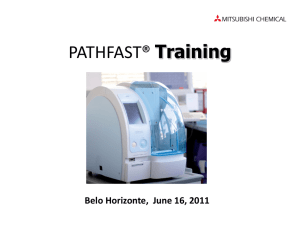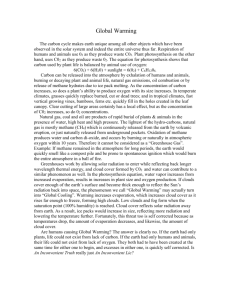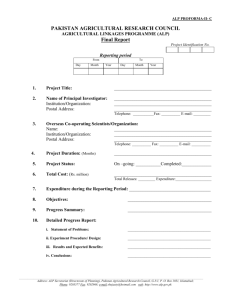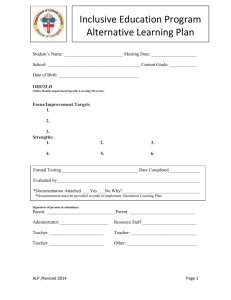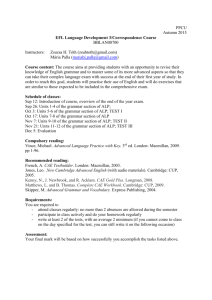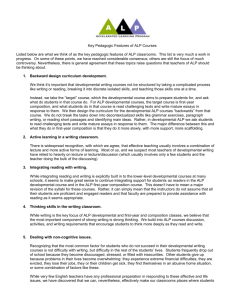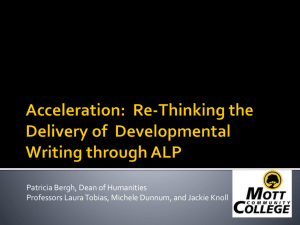The Triad Model - Atlantic Cape Community College
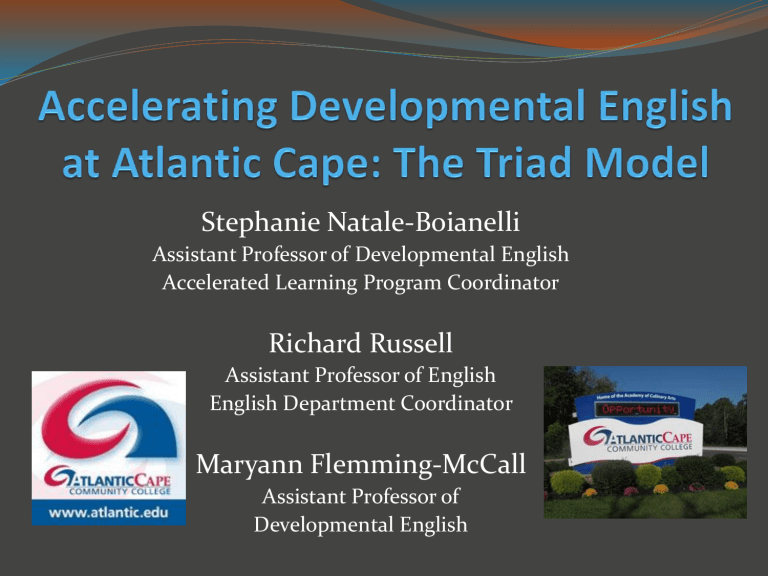
Stephanie Natale-Boianelli
Assistant Professor of Developmental English
Accelerated Learning Program Coordinator
Richard Russell
Assistant Professor of English
English Department Coordinator
Maryann Flemming-McCall
Assistant Professor of
Developmental English
Community College of Baltimore ALP Model
ENG 101 ENG 052
A L P
ALP Advantages (Baltimore model)
reduces stigma improves attachment provides stronger role model encourages learning communities changes attitude toward developmental course allows individual attention allows time for non-cognitive issues allows coordination of the two courses
A L P
The Accelerated Learning Program
The Triad Model
Once a week, ENGL099 meets in a computer lab.
ENGL099 & ENGL101 are both three credit courses.
ALP 080
Backward design Traditional course
The goal is for students to pass the college-level course.
Developmental course is taken concurrently with the college-level course.
Teacher is expected to both teach and mentor the students.
The goal is for students to pass the developmental course.
Developmental course is taken as a prerequisite to college-level course .
Teaching is the only expectation.
Focus on non-cognitive issues
No formal focus on non-cognitive issues
Two critical ALP features: Both courses are taught by the
same professor. Eleven of the students in the collegelevel course placed into credit-level English.
ALP Syllabus
Student Learning Outcomes/Objectives, similar to ENGL101 syllabus, with important additions:
Students will learn the value of being an active participant in a learning community: how to prepare for/attend classes; actively participate; respectfully/responsibly interact with learners; ethically collaborate/study for other classes.
Students will choose a program path for the next two years, study the schedule in the tabloid, make effective decisions for scheduling an academic semester. Students will discuss the pros and cons of shortened summer semesters and of online classes.
Students will become familiar with the college culture: make use of available and appropriate resources; meet with the instructor to discuss individual program; learn about essential services/procedures for registration and about extracurricular activities; etc.
Curriculum Planning
First day of each week: discuss questions from previous week in 101 and/or reading/writing concerns from other classes.
Instructor consideration: What should be reinforced in both
101 class and in ALP? What should be addressed in only
ALP?
Design “just in time” exercises/group activities within learning communities.
Sometimes student-generated concerns supersede planned activities.
Active learning; NOT drill and practice.
Personalize/contextualize learning for ALP students.
A Sample Week
English 101
Day 1
Discuss new words to the OED online.
Introductions. Review syllabus. Private writing.
HW: Read/annotate “The Coddling of the American Mind” (
The Atlantic
September 2015) for next class.
ALP
Day 1
(Re-)introductions: What is ALP?
Discuss active reading strategies.
Preview material; then read/annotate in pairs “Brainology” (Carol Dweck).
Compare annotations for the first part.
What is the most significant and most confusing/disturbing line in the second part? (These could be the same.) Etc.
Day 2 : Diagnostic reading/writing:
Summarize and respond to the article.
HW: Assign short response papers to
The Northside (Nelson Johnson).
Read/annotate “The Prologue” for next class.
Day 2 (computer lab)
Complete entrance survey and learning inventory.
On the discussion board, choose one word to describe Atlantic City.
Respond.
Spring 2012
Scaling Up: Timeline
Spring 2013-
Spring 2014
Fall 2012 Fall 2014 Spring 2014 Fall 2014
Effie
Russell pilots program with
11 students
4 triads;
3 campuses;
4-6 triads;
3 campuses
10 triads;
4 adjuncts; part-time students eligible
7 triads; first evening triad
14 triads
Engl080
Track
ALP
Track
Engl101
Track
Gateway Course Success
No. of Students 1173
English 101 Completion Rate 44%
English 102 Completion Rate 3%
Number of Semesters 3
329
84%
54%
2
1427
75%
49%
2
ALP students are also retained at higher rates than Engl080 and Engl101 students and complete and pass more credits than Engl080 students.
From “Replicating the Accelerated Learning Program: Preliminary But Promising
Findings” study conducted by the Center for Applied Research. You can access a copy of the study here: http://alp-deved.org/2014/02/findings-from-a-nationwide-alpstudy-just-released/
From “Replicating the Accelerated Learning Program: Preliminary But Promising
Findings” study conducted by the Center for Applied Research. You can access a copy of the study here: http://alp-deved.org/2014/02/findings-from-a-nationwide-alpstudy-just-released/
From “Replicating the Accelerated Learning Program: Updated Findings” study conducted by the Center for Applied Research.
Triad Model Advantages
Students
• Merging from two sections of Engl101 allows students to compare academic experiences.
• Larger class size fosters class discussion, creates a typical classroom environment, and allows for more diversity among the students.
Faculty
Administration
• Merging from two sections of Engl101 allows for authentic discussions of the diversity of the student experience.
• Scheduling is easy: two days, three classes in a row; a full load for adjuncts; 9 credits total is
3/5 of a full-time load.
• Class size is comparable to the developmental course.
Triad Model Challenges
Students
• Gaps can make the course schedule inconvenient.
Faculty
• Reaching every student individually in a single class session is difficult.
• Two Engl101 experiences must be united.
Coordinators
• Triads are complicated and difficult to schedule.
• Finding and training faculty can be difficult, especially part-time faculty.
Career Infusion
Curriculum & Faculty
Academic
Support Services
Student Affairs
Why Career Development?
Helps students identify and take ownership of goals
Connects goals to their education
Enables informed decision making for course selection/educational pathways
Supports Atlantic Cape’s ALP Learning Outcomes
Computer and Information literacy
Familiarity with college resources
Retention goals
Strengthens connection to college and to instructor
On-going Activities
Goals and values clarification through writing and discussion.
Sample readings:
“Four Steps to Choosing a College Major”
http://www.nytimes.com/2015/08/02/education/edlife/foursteps-to-choosing-a-career-path.html
“How to Live Wisely”
http://www.nytimes.com/2015/08/02/education/edlife/howto-live-wisely.html
Career Infusion
Collaborate with Student Affairs personnel who conduct Values Clarification activity.
Writing Assignment:
reflection piece on the experience
Added benefits:
Connected students with Student Affairs personnel
Students were given preparatory information for registration
Career Exploration
Activities
Took Holland Career Codes Quiz http://www.roguecc.edu/counseling/hollandcodes
Researched careers using Occupational Outlook
Handbook www.bls.gov/oco/
Writing Assignment: connection of goals/values with career choices
Discovering Campus with Scavenger Hunts
Discovering Campus:
Student Handbook Project
Step 1.
Review/discuss the official student handbook.
Step 2. Brainstorm topics that should be in our handbook.
Step 4. Create the handbook page.
Step 5.
Presentation/peer review.
Step 6. Revision and publication.
Step 3.
Research/explore topic in pairs.
Self-Assessment:
Reflective Writing
ICW (Week 1): Besides getting “good grades,” what are your goals for this semester? How will you ensure that you are working towards these goals?
Students will revisit these goals and their progress throughout the course.
Students write a short reflection/letter to me to submit with Paper #1.
ICW (Week 3): Discuss your writing process.
What was the most difficult part about writing Paper #1? What are the strengths of your paper?
Self-Assessment:
End-of-Term Reflection
I. What are characteristics of “good writing”? Use specific examples read for class and explain what made them effective.
II. What are your strengths as a writer? Use specific examples.
III. What are you still working on in your writing?
Some variation used for the “final exam”
Self-Assessment:
End-of-Term Reflection
From “Ending at the
Start” (David Gooblar),
The Chronicle of Higher
Education, 29 April 2015:
Write a letter to a future student of this class.
What do you wish you would have known before taking this class?
What should future students know about this class or professor?
(Advice.)
Thank you!
“I always felt like I was one step ahead of all the other kids in English 101 because of the extra work with the same professor.”
“I felt like the transition of coming into college was very smooth because I learned a lot here academically, but I also learned all my resources at the campus.”
“I felt more like a student at ACCC because I learned so much about not only
English as a course but this college as a whole.”
“ALP greatly helped my confidence in 101. At the beginning, I didn’t know or thought I didn’t know anything about reading and writing…ALP is awesome for becoming part of the Atlantic Cape family and meeting students at similar levels…Best class ever.” www.atlantic.edu/alp
